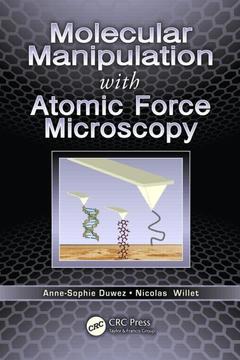Molecular Manipulation with Atomic Force Microscopy
Coordonnateurs : Duwez Anne-Sophie, Willet Nicolas

With the invention of scanning probe techniques in the early 1980s, scientists can now play with single atoms, single molecules, and even single bonds. Force, dynamics, and function can now be probed at the single-molecule level. Molecular Manipulation with Atomic Force Microscopy (AFM) presents a series of topics that discuss concepts and methodologies used to manipulate and study single (bio)molecules with AFM. The first part is dedicated to the pulling of single molecules with force spectroscopy to investigate molecular interactions, mechanics, and mechanochemical processes, and the second part to the manipulation, repositioning, and targeted delivery of single molecules on substrates.
Single molecule manipulation is an exciting area of research which made important breakthroughs in nanoscience and which could find potential applications in a diverse range of disciplines, including chemistry, biology, physics, material and polymer science, and engineering. New and experienced AFM researchers looking for applications beyond imaging will find a wealth of information in this informative volume.
Pulling on Single Molecules with Force Spectroscopy:Molecular Recognition Force Spectroscopy. Mechanics of Proteins and Tailored Mechanics of Engineered Proteins. Mechanics of Polysaccharides. Mechanics and Interactions in DNA and RNA.Mechanics of Synthetic Polymers. Interplays between Chemistry and Mechanics in Single Molecules. Manipulation, Repositioning, and Targeted Delivery of Single Molecules on Substrates: Molecular Construction: Pushing, Moving, Stretching, and Connecting Individual Molecules. Extracting Molecules from Surfaces. Single Molecule Delivery by Mechanochemistry. Single-Molecule Cut and Paste. Index
Anne-Sophie Duwez received her Ph.D. in Chemistry in 1997 from the University of Namur, Belgium. She then moved to the Catholic University of Louvain as a Post-doctoral Researcher of the Belgian National Fund for Scientific Research. In 2002-2003, she was visiting scientist at the Max-Planck Institute for Polymer Research in Mainz, Germany. She then returned to the Catholic University of Louvain as a senior scientist to develop AFM-based single molecule force spectroscopy. In 2006, she took up the Chair of Chemistry at Surfaces at the University of Liège. In 2007, she received a Starting Grant from the National Fund for Scientific Research to set up a new lab dedicated to advanced AFM techniques. She is currently professor of surface chemistry, chemistry of organic and bio materials, and nanotechnology. Her research interests focus on the development of AFM-based techniques, probes, and methods to manipulate single molecules. They include the investigation of mechanochemical processes in bio- and synthetic systems and the design of single molecule devices.
Nicolas Willet studied chemistry at the University of Liège, Belgium. He studied protein folding during his master thesis and received his Ph.D. in 2007 for his work on the synthesis and characterization of triblock copolymer self-assemblies, carried out under the supervision of Professor Robert Jérôme (polymer chemistry). He then moved to the team of Professor Anne-Sophie Duwez where he performed AFM force spectroscopy on bio-inspired polymers. After his postdoctoral work with Professor Peter Hinterdorfer at the Institute of Biophysics of the University of Linz, Austria, he went back to the University of Liège in 2011, where he is currently working as an FNRS postdoctoral researcher. His research interests concern functional and responsive polymers, single-molecule force spectroscopy, molecular recognition, with a particular focus on the investigation of biological mac
Date de parution : 01-2012
15.6x23.4 cm
Thèmes de Molecular Manipulation with Atomic Force Microscopy :
Mots-clés :
Single Molecule Force Spectroscopy; Force Spectroscopy; atomic force microscopy; AFM Tip; single-molecule force spectrocscopy; Force Extension Curves; mechanochemistry; Unbinding Force; Peg Linker; Rupture Force; AFM; SMD Simulation; American Chemical Society; Single Molecule AFM; Normalized Extension; Contour Length; Mechanochemistry Approach; AFM Probe; C5 C6 Bond; Single Polymer Chain; DNA Target Sequence; AFM System; Protein DNA Interaction; Glycosidic Oxygen Atoms; Pyranose Ring; Protein DNA Complex; GB1 Protein; AFM Measurement
